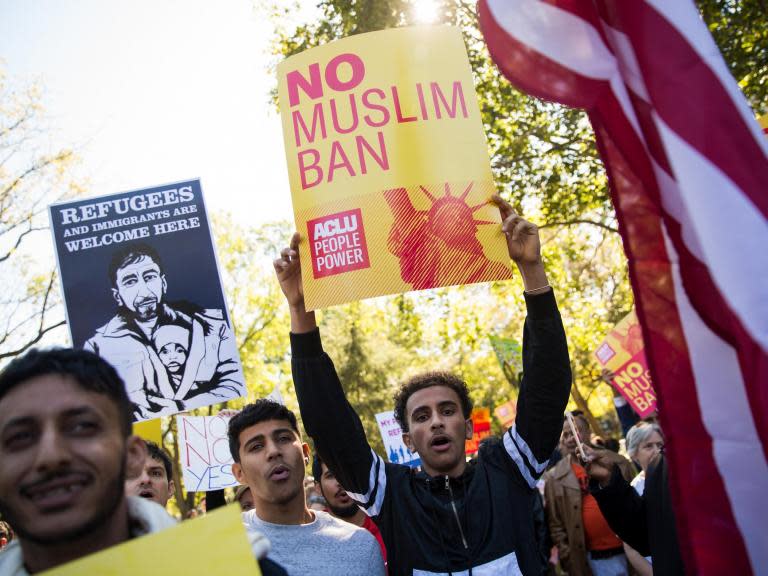As the Supreme Court prepares for tomorrow's hearing on the travel ban, we must remember America's dark history of failing refugees
Tomorrow the US Supreme Court will hear the Trump administration defend its right to enforce the ban on residents of five majority Muslim countries – many of whom are refugees. But this isn’t the first time America has taken a stand on this issue.
On May 28, 1939, some 937 Jewish refugees fleeing Nazi Germany sailed on the SS St Louis to America, passing so close to Miami the city lights were visible. They sent a cable to President Franklin Roosevelt – it read: “Seeking refuge.”
Roosevelt refused to so much as acknowledge the ship’s arrival and denied their request. Running short on supplies and the risk of mass suicide on board exponentially increasing, the SS St Louis and its 937 Jewish refugees were forced to return to Europe. There, 254 of them died at the hands of Nazis. Still, according to American law at the time, President Roosevelt acted legally.
A few decades later, the US would achieve an important moral milestone by passing a law that banned the sort of quotas that kept those refugees out. This progress is now being undone by President Trump’s Muslim ban, which rejects refugees and others seeking a better life, based on their nationality.
There’s an ideological battle raging in 2018 America, and it isn’t between liberals and conservatives. It’s between the right and the wrong side of history. The past 15 months have staunchly divided the country with approval for the Muslim ban rising as high as 60 per cent. We’ve been here before. In a 1939 survey asking whether America should accept Jewish child refugees escaping Nazi Germany, 61 per cent of respondents voted to send them back to Hitler and 83 per cent rejected a move to raise the cap on European refugees altogether.
American history has repeatedly proven that legality is not a function of morality or justice – it is a function of power. Native American genocide was legal, slavery was legal, Jim Crow was legal, Japanese concentration camps were legal, and to this day, police killing unarmed black women and men at epidemic rates is often seen as legal.
I don’t accept the premise by some on the left that conservatives want child refugees to die at the hands of a dictator. Nor do I accept the premise by some on the right that liberals want open borders and don’t care for national security. These bombastic mischaracterisations result in further dividing our nation. I submit we reframe this argument not as a legal one—but as a far more useful one that reflects on identifying the right and wrong side of history.
As a lawyer, I’ve spent several years serving a client base of women who are immigrants, refugees, and survivors of domestic and sexual violence. In many cases, I’ve come face to face with the very people the ban intends to block. Notwithstanding the importance of understanding the gruelling two-year process and national security measures the United States refugee relocation programme mandates, those who oppose this ban must understand who it is actually blocking. If ban proponents took a moment to see these refugees, they’d realise that roughly 73 per cent of Syrian refugees are women and children.
The Muslim ban – while professing to promote safety and security – in fact substantively harms the safety and security of countless marginalised women and children by forcing them into further danger. American NGO Human Rights First reports that from Syria alone “4.8 million people have been rendered refugees and nearly all of them are acutely vulnerable to human trafficking,” and this includes sex trafficking and abuse of children.
American society has spent the last year finally exposing institutionalised misogyny and sexual abuse against women through, for example, the #MeToo movement. While this is one step forward, it is yet another grave injustice to simultaneously and forcibly deny marginalised women and children the safety and security that refugees and indeed all people deserve.
Meanwhile, history demonstrates the marginal and virtually non-existent threat to national security by refugees. No refugee admitted to the United States in the past 40 years, Muslim or otherwise, has committed an act of terrorism that killed an American. Not one death. Moreover, if we really don't want refugees, let's stop creating them. According to estimates, US-led bombings may have killed up to 6,000 civilians in Iraq and Syria since 2014, furthering the instability that forces refugees to flee for their lives.
Standing against the ban means standing for something far more important – universal religious freedom, one of America’s bedrock values.
International Muslim leaders like the Khalifa of Islam have called upon refugees to, “remain entirely faithful to their adopted nation and use all of their abilities to help their country advance and prosper.” Indeed, refugees and immigrants are historically law-abiding with crime rates significantly lower than born American citizens.
Journalist and historian Sean Braswell wrote the following about the SS St Louis, “[President] FDR himself took no public stand on the issue, and we now know that despite first lady Eleanor Roosevelt pushing him, the president did little to aid the refugee bill. [He was] concerned with the broader landscape of American foreign policy [and] national security…”
Today we know better, so we must be better. Let us hope the Supreme Court uses its power to stop us from repeating the crimes of our past.
Qasim Rashid is the national spokesperson for the Ahmadiyya Muslim Community USA and a Truman National Security Fellow

 Yahoo News
Yahoo News 

